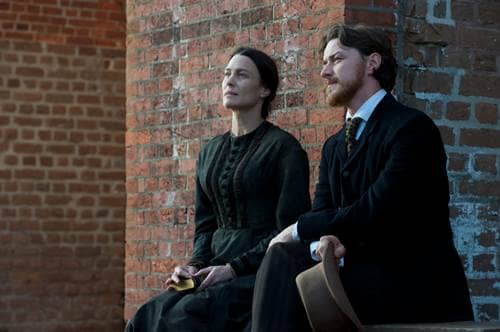
“The Conspirator is about one of the most remarkable American stories hardly known. I think everyone thinks they know the story of the Lincoln assassination, and it turns out most of us don’t.” I’m on the phone with James Solomon, the screenwriter of the new period courtroom thriller The Conspirator, directed by Robert Redford and starring Robin Wright Penn and James McAvoy. “When I started in 1993, I thought the assassination of President Lincoln was ‘Booth Shoots President Lincoln in Ford’s Theater,’ end of story. I had no idea on the night of April 14, 1865 there was an attempt on the Secretary of State; that there was someone at the residence of the Vice President to kill him; [that] hundreds were rounded up; that there was a trial of eight civilians in military court; and one of them was a woman who ran a boarding house named Mary Surratt and that she was likely on trial for crimes committed by her own son.”
Solomon is passionate but soft-spoken and deliberate. He is equally ready to praise the work of the filmmakers who have brought his vision to life as he is to defend the historical accuracy of the film. The film itself, much like its author, is methodical and unhurried as it tells the true story of Mary Surratt (Robin Wright Penn in a brilliant, impassioned performance), a Confederate widow who was charged with conspiring to murder the President. James McAvoy plays Frederick Aiken, a young war-hero-turned-attorney who initially balks at defending one of Lincoln’s supposed killers, but ultimately comes around to her side as he witnesses the lengths to which the prosecutors are willing to go to secure a conviction. Surratt’s son was John Wilkes Booth’s right-hand man, and the plans by Booth and his cohorts to decapitate the leadership of the government were hatched within her boarding house, but the extent to which she was complicit in the conspiracy remains a hotly debated topic within academic circles. The film, under Robert Redford’s sure handed and subtle direction, may lean towards an opinion on the matter, but it ultimately shies away from taking an explicit stance. “The only thing we know for certain about Mary Surratt’s guilt or innocence is that we don’t know for certain what her guilt or innocence is,” Solomon says.
Such an ambiguous stance has frustrated critics either looking for black and white answers or hoping to shoehorn the film into a preconceived political box. To many, the post-9/11 parallels are both unmistakable and purposeful: terrorist attacks, military tribunals, hooded detainees, and government justice that rides rip shod over its citizen’s rights in the name of “security.” Armond White of the New York Press went so far as to declare the film a “direct allegory for the current Khalid Sheikh Mohammed 9/11 conspiracy controversy,” even suggesting that Redford appears to be in current Attorney General Eric Holder’s pocket.
The problem with such an interpretation, of course, is that the film was written before George W. Bush was even elected governor of Texas. “I had no idea of knowing or anticipating the way events would unfold after September 11,” says Solomon. “In fact, when I first wrote it, the comment that I got from many readers was, ‘Fascinating story. I didn’t know this happened. Nicely told. But what does it have to do with the present?’ After September 11, 2001, I never heard that.”
When asked if he’s felt anger or frustration over the political climate of the last decade and whether such emotions might have snuck their way into The Conspirator, he responds, “My objective from the very beginning was to faithfully and accurately portray the events as they occurred…That has always been my focus and with a particular emphasis on the human relationship between Mary Surratt and Frederick Aiken.” But, having studied this case with such precision, do some of the events of the last decade anger you? “It has been stunning to me to have a first row seat, if you will, on the way in which history repeats. To have portrayed or told a story, and then to see certain – not full – but some parallels to the present.” Other than that, he would prefer the film comment on the current state of American affairs by itself.
Regardless of The Conspirator’s political stance or the possible motivations of its creators, the film remains a fascinating look into a relatively unknown period of American history, as well as being a touching human drama. “At the center of this extraordinary moment in American history, is an extraordinary human story about a mother abandoned by her son, Mary Surratt abandoned by her son John, and a surrogate son, Frederick Aiken, her lawyer, a northern officer who is compelled to defend a southern woman accused of murdering his commander in chief. [It’s] an incredible story.”
The Conspirator is currently playing in theaters nationwide. Next up for screenwriter James Solomon is an action-thriller for director Simon Crane.


